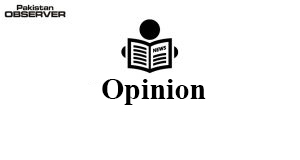Articles and letters may be edited for the purposes of clarity and space. They are published in good faith with a view to enlightening all the stakeholders. However, the contents of these writings may not necessarily match the views of the newspaper.
NDMA
A report has been given on traumatic death of 23 citizens, who died stranded on a snow-covered road in an habited area of Murree, where thousands of state employees both civil and uniformed are posted, equipped with paraphernalia required at hill station where snow fall, rains, landslides and tree uprooting etc. occurs every year.
The report seems to be an eyewash because it fails to identify whether the 2 km road adjacent to Kuldunna, where citizens were stranded in their vehicles was under civil administration or cantonment executive board. It also fails to point out role of NDMA created to provide relief and rescue in such disasters, in coordination with PDMA and all other state institutions.
Giving Murree status of a Tehsil or District or even a division will only provide jobs for few, but will not serve any other purpose. It was an avoidable tragedy if all the state funded organisations, based there, had coordinated to prevent a disaster that occurred because of sheer incompetence and arrogance of those responsible to serve and protect people whose taxes fund their salaries, perks etc. The snow removing equipment existed but was either unserviceable or did not have fuel and drivers required to operate them.
The NDMA was established in 2007 to formulate policies for crisis management and provide relief and rescue in disaster-stricken areas all over the country, instead of being reduced to another state organisation providing jobs to retired personal who cannot be held accountable.
Rescue and Relief Operations are specialized skills that can be acquired by recruiting qualified personnel given extensive training. An audit must be carried out. Unless those responsible for criminal negligence are given exemplary punishments, dismissed from service, followed by imprisonment after a judicial process, such disasters will continue to occur.
ALI MALIK TARIQ
Lahore
Balochistan vociferates for education
Balochistan, Pakistan’s richest-in-resources province, vociferates with a growing ratio of illiteracy – especially in higher education. The province merely owns nine universities which cannot succeed to accommodate the whole students of a hundred and sixteen (116) inter and degree colleges in the newly introduced BS programs. Sadly, the annual budget also allocates less resources in the education sector indicating how the federal and provincial governments offer less priority to education.
Recently, the Pakistani government announced to donate eleven billion rupees to Kabul (Afghanistan) for the establishment of a university on the name of Allama Iqbal. It is although a good gesture to support Afghanistan in such crises with the fall of Kabul and emergence of a new government, but it is even more heartbreaking to see the most resource-generating province of the country getting the least bit of attention towards the primary need for development – a good education.
A major flaw in our education system is a lack of required universities to place in the college graduates of the whole province. Some divisions [Rakhshan and Nasirabad] still require universities where students would continue their education further. Makuran, a division sharing borders with Iran, consists of two universities (University of Turbat established in 2012 and Gwadar University established at the end of 2021). Kalat has only two universities, Quetta has four and Zhob has one.
In contrast with solely nine universities of Balochistan, Punjab has sixty-eight (68) universities, Sindh has fifty-six (56) and Khyber-Pakhtunkhwaa has forty-one (41) universities. Given a population of 12.34 million people and considering the resources which the province possesses, nine universities cannot satisfy the need of the residents of Balochistan.
MUNEEB MAQSOOD
Balochistan
Let’s develop our thought process
By the grace of God, we have every available talent and abundance of natural resources yet unfortunately being a nation we must ponder that why among all countries our ranking in all spheres of life has always remained low. Are we intellectually bankrupt that among millions there would be a few who would like to talk about this? Why are we afraid of following rule of law in all spheres of life and don’t set personal examples to show to other people that Islam wants us to follow rule and regulations in our daily life. There is a dire need of changing and rehabilitating our mindset and as a nation we should start practicing it in our daily life.
INSAF ALI BANGWAR
Via eamil










